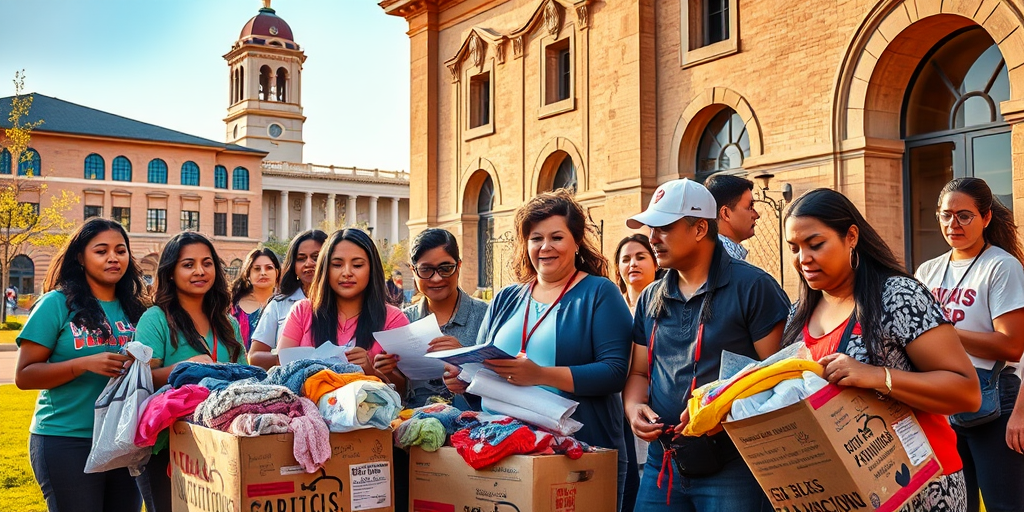STC Vocational Nursing Program Rallies for Texas Hill Country Flood Victims
In a heartwarming demonstration of unity and compassion, South Texas College’s (STC) Vocational Nursing program has mobilized to support families devastated by severe flooding in Central Texas, a catastrophe that has taken more than 100 lives across the Hill Country region during the Fourth of July weekend. This initiative highlights the strong community bonds within the Rio Grande Valley (RGV) and the importance of local impact during times of crisis.
A Community-Driven Effort
The relief effort initially began as a proposal from a dedicated faculty member at STC and quickly gained momentum, expanding into a comprehensive campus-wide initiative. Faculty, staff, and students from the Starr County Campus have banded together to collect and donate essential supplies, including clothing, non-perishable food items, baby necessities, and hygiene products. These contributions are now making their way to some of the most severely affected areas, providing immediate support and hope in the face of disaster.
Local Collaboration and Impact
In partnership with the City of Escobares and Starr County Memorial Hospital, the STC Nursing program’s efforts have gained even greater traction. The collaboration underscores the power of local communities working together to extend a helping hand to fellow Texans in dire need.
Jose Garcia, Mayor of Escobares, emphasized the significance of local initiatives in times of disaster. “When tragedy strikes, every piece of aid counts. Our community has always stood together, and I’m proud to see our students and institutions leading the charge to help a part of Texas that is suffering deeply,” Garcia stated.
Valley Residents Responding to Call of Duty
This type of rallying effort is not new to Valley residents. The RGV community has a well-documented history of coming together to support those affected by natural calamities, whether local or beyond. The collective spirit and resilience serve as an inspiring reminder of the strength of shared purpose and compassion in the Valley.
Ana Rodriguez, a student volunteer with STC, shared her thoughts on the significance of their initiative: “As nursing students, we are trained to care for others. This relief effort is just an extension of what we have learned. It’s about providing a shoulder to lean on and showing solidarity as we help rebuild lives.”
A Broader Context: Regional Concerns and Past Lessons
Central Texas is no stranger to flooding, and the Hill Country’s recent disaster has reignited discussions on climate resilience and preparedness. The RGV itself is prone to severe weather events, such as hurricanes and floods, making the lessons learned from these relief efforts particularly relevant to the local community.
Dr. Marie L. Valencia, a professor of Environmental Science at the University of Texas Rio Grande Valley, highlighted this connection: “The RGV, much like Central Texas, faces the risks of flooding amplified by climate change. By participating in relief efforts, the community not only aids others but also strengthens its own preparedness and adaptability to similar potential threats.”
Looking Forward: Implications and Continuing Support
The actions taken by STC exemplify a spirit of volunteerism and communal responsibility that is expected to have long-lasting effects on both the immediate flood relief efforts and future community-focused initiatives. The support and determination shown by Valley residents are pivotal in inspiring further collective actions across Texas, reinforcing the importance of statewide community solidarity.
For those interested in offering further support, the Vocational Nursing program at STC plans to continue its collection drive and is urging the community to participate. Donations can be made at designated drop-off points listed online, or checks can be mailed to Starr County Memorial Hospital with the designated purpose of Texas Flood Relief.
Diverging Perspectives in Policy and Preparedness
While the relief efforts have received widespread praise, the situation also raises important questions about policy and infrastructure readiness. Critics point out that while immediate assistance is crucial, there must also be a sustained focus on creating robust long-term solutions to prevent future disasters or mitigate their impact.
Community leader and former city council member, Robert Castillo, provided his insight on the issue: “Addressing disasters should extend beyond immediate relief. It’s essential that as a community and as a state, we press for infrastructural reforms and disaster preparedness strategies that protect lives and property.”
Engaging with the Community: How You Can Help
Valley residents eager to contribute can reach out to the STC’s program through their website for detailed guidelines on donations and volunteer opportunities. Additional information regarding the ongoing relief operations and future updates can be obtained directly by contacting the designated helpdesk at the Texas Border Business website, a key platform for commerce and community news across the region.
In conclusion, STC’s initiative represents a powerful testament to the impactful role of community service in times of crisis, exemplifying how regional solidarity can drive profound change and relief, thereby reinforcing the resilient and compassionate spirit of the RGV community.







